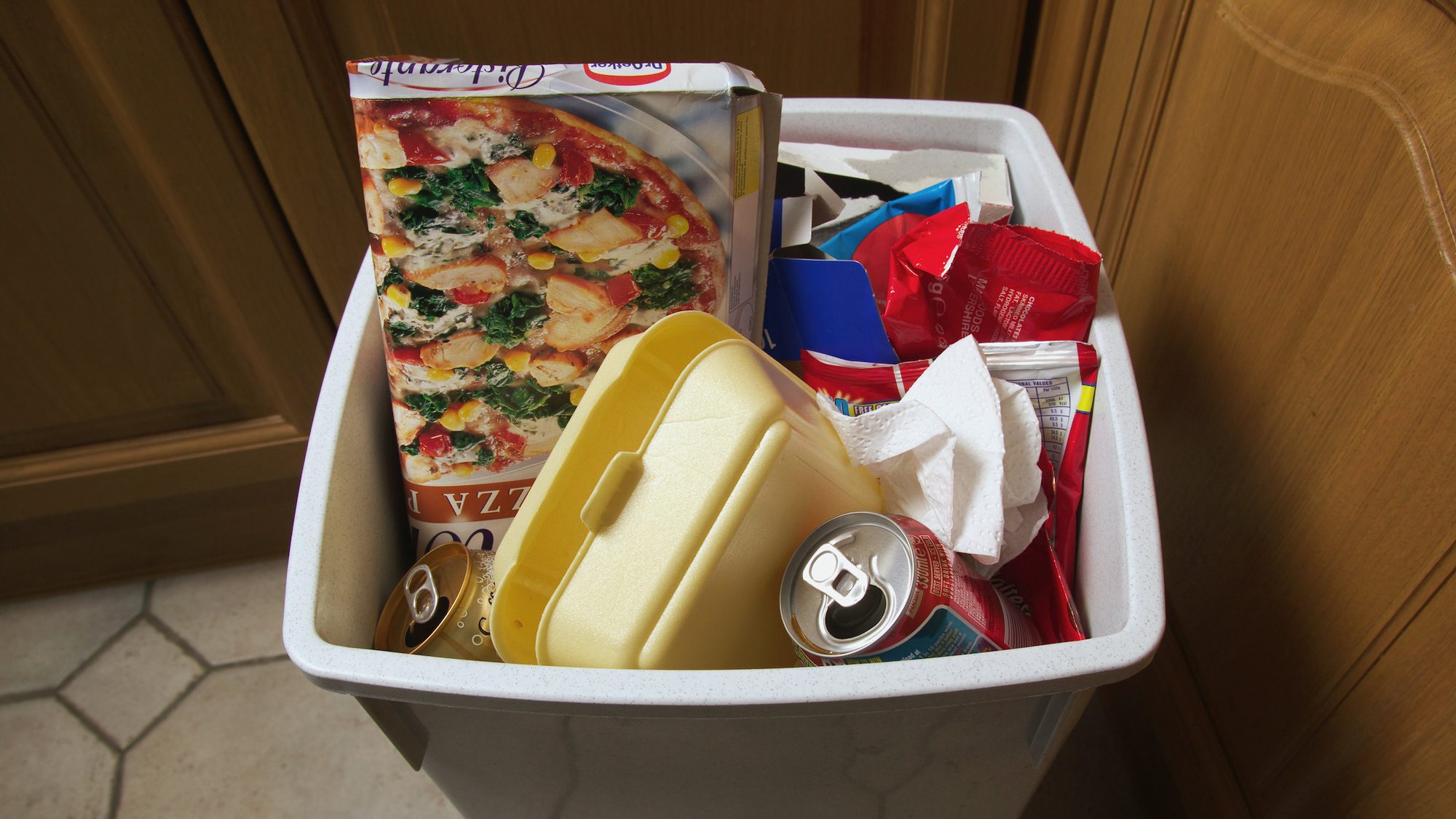
GSO Images/Getty Images
If there’s one thing to know about reducing waste, it’s that all of us can improve. And what better place to start your sustainability efforts than in the kitchen? Not only is this the place where we’ll be spending a lot of time over the next couple months, but it’s also where—arguably—we produce the most trash as we make meals (or just dump takeout onto plates) and store food.
Minimizing how much garbage your family creates might sound like a herculean task. But like anything else, a few small (and ridiculously easy) changes really can make a big difference. We spoke with several sustainability experts to get these six tips to help you reduce kitchen waste.
1. Find plastic alternatives
By some estimates, plastic can take up to 1,000 years to decompose—so it’s no wonder that finding alternatives is the first item on our list. Unlike paper and other easy-to-recycle products, plastics are one of the main culprits clogging up landfills and creating “garbage patch” islands the size of France in our oceans.
“The solution is to stop using plastic whenever possible,” says sustainable lifestyle blogger Brittany Merriman, of BonVoyageBrittany. “Plastic alternatives include bar soaps rather than bottled, beeswax wraps for food, glass of any kind, and tin foil.
“Many people forget that tin foil is not only recyclable but great to reuse in the house several times over,” Merriman adds. “As long as it doesn’t rip, it’s reusable indefinitely—simply wash it!”
2. Shop sustainably
“A big way to reduce waste in the kitchen starts at the store,” says Merriman. “Avoid delivered meal services when possible—they drastically up your food waste. Instead, shop for unpackaged fresh foods at your locally owned supermarket or farmers market.”
If you have to buy prepacked food, Merriman suggests getting things that have been packaged in cans and cardboard, rather than plastic, whenever possible.
Finally, remember to skip the plastic or paper bags at the checkout and bring your own reusable ones instead. (Some supermarkets are limiting the use of reusable bags during the pandemic, so check before you shop.)
“You can even bring reusable bags for your produce,” says Merriman. “I make my own out of T-shirts, but they’re also easily found on Amazon.”
3. Buy in bulk
Buying in bulk will also reduce the amount of plastic or other packaging you end up with at the grocery store.
“When you buy in bulk, such as bags of spices, you avoid small packaging that immediately goes into the trash,” says David Cusick of House Method. “Use refillable bottles for your spices and other bulk purchases instead. In addition to reducing waste, you’ll also save money since bulk purchases are generally cheaper.”
4. Keep food waste in check
Now that you know a bit more about avoiding plastics and unnecessary packaging, let’s talk about curbing actual food waste—you know, all the meals that aren’t finished and leftovers that get tossed.
“One of my top tips is to plan your meals ahead,” says executive chef Kevin Templeton, from San Diego’s barleymash. “When you do this, you can create meals throughout the week where all items are used several times.
“For example, you may cut up carrots for a salad topping, roast them for a dinner side, or dip them in hummus for a snack,” he adds. “Cross-utilization is key in reducing food waste, and reducing the chance of your produce spoiling before you use it.”
5. Start composting
Since some food (even if it’s only small scraps) will inevitably get thrown away, it’s good to start getting into the habit of composting. You don’t necessarily need a yard; many major cities offer composting services for residents.
If you do have some outdoor space, consider building your own compost pile. Throw in all of your non-animal product food waste like vegetables, fruits, bread, cereal, and even old coffee grounds.
“Coffee grounds and iced tea grinds help break down the compost faster by supplying nitrogen to the system,” says Templeton.
Not only will composting reduce the waste that ends up in your local landfill, but it also makes a great natural fertilizer for your garden.
6. Reuse and recycle
This one might sound obvious, but bear with us.
Recycling isn’t as foolproof as it may seem, which is why it’s not only important to get it right, but also to reuse nonrecyclable items as much as possible.
“What most people don’t realize about recycling is that we rely on it far too much,” says Merriman. “A lot of people recycle incorrectly, and although recycling capacities differ between municipalities, several types of plastic simply cannot be recycled.”
Merriman explains that the best way to determine if you have a recyclable item is by checking the number on it.
“Most plastics with Nos. 1 or 2 are generally recyclable everywhere,” she says. “However, Nos. 3, 5, and 6 are commonly used in the kitchen and aren’t recyclable in many cases.”
So what do you do with those nonrecyclable plastics found in the kitchen? Reuse them as much as possible.
“Type 2 plastics and type 5 plastics—which include things like yogurt containers, ketchup bottles, and milk jugs—are all reusable,” says Merriman.
So before you go out shopping for brand-new plastic food containers, take a second to find out what your community actually accepts for recyclables, and then make a plan for reusing the rest.
The post We Drastically Reduced Our Kitchen Waste With These 6 Ridiculously Easy Methods appeared first on Real Estate News & Insights | realtor.com®.
No comments:
Post a Comment